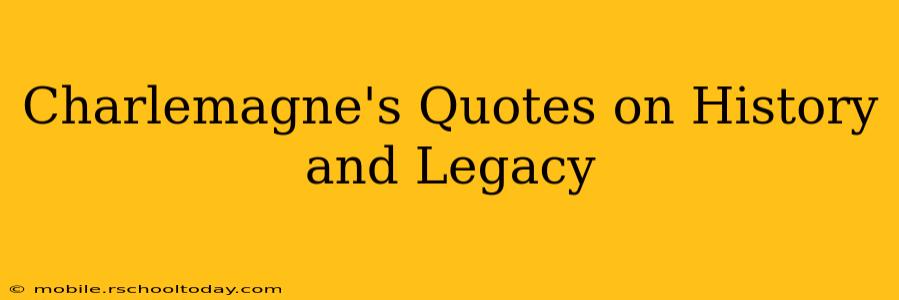Charlemagne, the King of the Franks who reigned from 768 to 814 AD, remains a towering figure in European history. His impact extended far beyond military conquest, shaping the political, cultural, and intellectual landscape of the early Middle Ages. While direct quotes attributed to Charlemagne are scarce, we can glean his views on history and legacy through the writings of his contemporaries and the actions he took during his reign. This exploration delves into the themes present in his life and actions that reflect his understanding of his role in history. We'll examine what we can infer from available sources, analyzing how his policies and ambitions shaped his lasting legacy.
What did Charlemagne say about his legacy?
This is the most significant challenge in exploring Charlemagne's thoughts on his historical impact. Unlike many later rulers who commissioned elaborate self-portraits in writing, there's no surviving collection of Charlemagne's personal reflections on his goals or his vision for posterity. Our understanding must be pieced together indirectly. We can examine the actions he took – promoting literacy, standardizing weights and measures, codifying laws – as evidence of his desire to leave a lasting mark. These actions suggest a man acutely aware of his position in history and eager to shape the future according to his vision of a unified and ordered society.
What were Charlemagne's main achievements?
Charlemagne's achievements are multifaceted and enduring. His military prowess expanded the Frankish kingdom significantly, bringing much of Western Europe under his control. But his impact extended far beyond the battlefield.
-
Educational Reforms: He actively promoted education and the revival of learning, establishing schools throughout his empire and encouraging the copying and preservation of ancient texts. This effort contributed significantly to the Carolingian Renaissance, a period of intellectual and cultural flourishing.
-
Administrative Reforms: Charlemagne implemented significant administrative reforms, aiming for a more unified and efficient governance system. This included standardizing weights and measures, reforming the legal code, and strengthening the imperial bureaucracy.
-
Religious Reforms: He played a key role in the religious unification of Europe, supporting the Church and actively promoting missionary activities. His efforts contributed to the spread of Christianity and the establishment of a more centralized religious authority.
These achievements demonstrate a conscious effort to shape not only the political landscape but also the cultural and intellectual fabric of his realm. His actions speak volumes about his understanding of the importance of legacy, albeit indirectly.
How did Charlemagne view the history of the Roman Empire?
Charlemagne saw himself as the heir to the Roman Empire, consciously reviving aspects of Roman governance and culture. This isn't directly expressed as a quote, but his policies reflect this aspiration. His coronation as Emperor of the Romans by Pope Leo III in 800 AD symbolized this ambition. This act, even if contentious with the Byzantine Empire, showcases his conscious engagement with the narrative of Roman history, positioning himself as its rightful successor. He sought to emulate the grandeur and authority of Roman rule, aiming to build a unified and powerful empire that would stand the test of time.
Did Charlemagne leave any writings or letters?
While Charlemagne himself did not leave behind a large body of personal writings in the same way as, say, a Roman emperor, there are surviving documents that demonstrate his commitment to literacy and his influence on intellectual life. Many letters and decrees exist, written by his scribes, that offer insights into his policies and decisions. These documents, while not direct quotes from Charlemagne himself, are invaluable in understanding his aims and intentions. They provide glimpses into his thought process and his dedication to a strong, unified, and cultured empire.
What is Charlemagne's legacy today?
Charlemagne's legacy is profound and multifaceted. He is remembered for his political achievements, his promotion of learning, and his contribution to the development of European culture. His reign marks a significant turning point in European history, establishing a precedent for the centralized, religiously unified states that would shape the continent's future. While we may lack direct quotes expressing his personal view of his historical impact, his actions and the lasting influence of his reign leave no doubt about his lasting importance. His legacy continues to be debated and analyzed, underscoring his enduring significance in the historical narrative.
